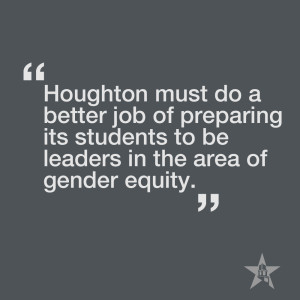Last week’s STAR described recent mandates concerning the 1972 Federal law on gender equity known as “Title IX” to the problem of relationship violence on campuses. Students at Houghton can celebrate that they live in an environment free of much of the outwardly destructive behavior that characterizes many schools. What, then, does Title IX have to do with Houghton? The goal of Title IX at Houghton is to promote the education of students, specifically as this relates to Houghton Goal #5: “Ground students in a strong biblical worldview in the Wesleyan tradition that allows them to be deeply and thoughtfully Christian so as to transform culture through redeeming action.” Much of the conversation I hear around campus falls short of the standard of being “deep” or “thoughtful” and much of our energy seems devoted to defending a particular stereotyped vision of gender roles rather than invested in “redeeming action”. Houghton must do a better job of preparing its students to be leaders in the area of gender equity.
 Former President Jimmy Carter’s A Call to Action: Women, Religion, Violence, and Power states, “ . . . in my opinion, Jesus Christ was the greatest liberator of women in a society where they had been considered throughout biblical history to be inferior.” If we are followers of Christ, we must be fearless in opening ourselves to the possibility that the privileges we enjoy hinder us from seeing the extent of the work yet to be done. In calling us to be agents of redemption in the world, is Christ calling us to be “Human Rights’ Activists”? If so, what does this look like? Perhaps just as importantly, what are the distractions or petty disagreements that seem to draw us away from our calling?
Former President Jimmy Carter’s A Call to Action: Women, Religion, Violence, and Power states, “ . . . in my opinion, Jesus Christ was the greatest liberator of women in a society where they had been considered throughout biblical history to be inferior.” If we are followers of Christ, we must be fearless in opening ourselves to the possibility that the privileges we enjoy hinder us from seeing the extent of the work yet to be done. In calling us to be agents of redemption in the world, is Christ calling us to be “Human Rights’ Activists”? If so, what does this look like? Perhaps just as importantly, what are the distractions or petty disagreements that seem to draw us away from our calling?
My job as Title IX Coordinator is to encourage thoughtful consideration of questions such as, “In what ways are we influenced by the larger culture regarding gender in a way that is harmful to our understanding of what it means to be created in God’s image? How do both women and men contribute to and sustain the difficulties we have in relating to one another in Christ-honoring ways? How does language impact our views of women and men? What implications are there for using the word ‘girls’ to describe females over 18 and using ‘men’ or ‘guys’ to describe males over 18? Why don’t we have a universal policy of gender-friendly language for our course syllabi?”
 If they are to follow Christ’s lead in gender justice, Houghton graduates must wrestle with questions, such as, Why does the self-confidence of girls decrease sharply just as they reach puberty? Why is it okay to use disparaging comments when referring to girls and women (e.g. “You throw like a girl” – see SuperBowl 49 commercial)? Why do women speak less in mixed groups, including during class discussions? How much should it concern us that the phrase,” I totally raped you!”, is likely to refer to beating someone in a videogame? Why is it that so many young women, including Christians, feel that they owe a man something if he compliments them and pays attention to them? How can Christian women be empowered to have a voice and to assert themselves while nurturing the belief that Christians are to place service to others above self? How does a culture of patriarchy within the church contribute to a climate of female restraint and male entitlement that hinders the full development of both men and women? How do we respond to the complaint from a sister or brother that something we have said or done has negatively impacted her or him, regardless of any lack of intent to do harm?
If they are to follow Christ’s lead in gender justice, Houghton graduates must wrestle with questions, such as, Why does the self-confidence of girls decrease sharply just as they reach puberty? Why is it okay to use disparaging comments when referring to girls and women (e.g. “You throw like a girl” – see SuperBowl 49 commercial)? Why do women speak less in mixed groups, including during class discussions? How much should it concern us that the phrase,” I totally raped you!”, is likely to refer to beating someone in a videogame? Why is it that so many young women, including Christians, feel that they owe a man something if he compliments them and pays attention to them? How can Christian women be empowered to have a voice and to assert themselves while nurturing the belief that Christians are to place service to others above self? How does a culture of patriarchy within the church contribute to a climate of female restraint and male entitlement that hinders the full development of both men and women? How do we respond to the complaint from a sister or brother that something we have said or done has negatively impacted her or him, regardless of any lack of intent to do harm?
Transformation needs to occur, but first we seek the truth with humility. Thankfully, Christ and scriptures such as Galatians 3:28, which states “There is neither Jew nor Greek, there is neither bond nor free, there is neither male nor female; for ye are all one in Christ Jesus” give us direction. As Emma Brittain noted in, How Houghton Handles Racism, “. . . if we are not sensitive to race, we can’t be intentional about combating racism.” We must open ourselves up to conversations that are difficult, that make us uncomfortable, and on which we disagree. This is the best way to hold ourselves and one another accountable. There is work to be done at Houghton.
